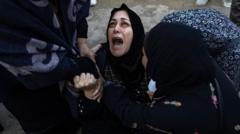Article Text:
As the conflict in Gaza escalates, Israeli airstrikes have resulted in the deaths of at least 35 Palestinians, including 12 individuals who were guarding incoming humanitarian aid lorries, according to local medics and the Hamas-operated Civil Defence authority. Among the casualties, seven guards were killed in Rafah while trying to secure aid vehicles from violent theft, an issue identified by UN workers as a significant barrier to providing humanitarian supplies in southern Gaza. Another strike in Khan Younis left five guards dead.
In response, the Israeli military stated that their operations were targeted strikes against Hamas militants believed to be planning to hijack the aid trucks. The military described the strikes as precise, aimed at terrorist plots that would impede aid distribution. Civil Defence spokesman Mahmoud Basal condemned the attacks, stating that the targeted strikes specifically hit those entrusted with securing the aid trucks. He noted that approximately 30 others, many of whom are children, were also injured in the strikes.
The aid trucks were reportedly transporting flour to warehouses operated by the UN Relief and Works Agency for Palestine Refugees (UNRWA). The ongoing conflict has plunged the region into severe food shortages, with armed thefts complicating aid delivery efforts. In response to this crisis, local civilians and remnants of Hamas' police force have come together to combat the increasing prevalence of gang activities.
Hamas spokespersons have claimed that since the current conflict escalated on October 7, their forces have lost over 700 police tasked with securing aid routes in Gaza due to Israeli operations. The Israel Defense Forces (IDF) emphasized that their airstrikes were conducted based on intelligence indicating the presence of Hamas operatives planning violent hijackings of humanitarian aid.
The international community has witnessed a failure of mediation efforts to end the hostilities, while Israel's defense Minister suggested the possibility of negotiations that could facilitate the return of hostages, including American citizens. This commentary comes amid growing recognition of the humanitarian crisis on the ground, which has seen over 44,800 reported deaths in Gaza since the conflict escalated, as reported by Hamas' health ministry.
The situation remains precarious, as airstrikes in areas such as Nuseirat and various locations in Gaza City have claimed additional lives, further complicating the landscape for aid efforts and civilian safety in the region.
As the conflict in Gaza escalates, Israeli airstrikes have resulted in the deaths of at least 35 Palestinians, including 12 individuals who were guarding incoming humanitarian aid lorries, according to local medics and the Hamas-operated Civil Defence authority. Among the casualties, seven guards were killed in Rafah while trying to secure aid vehicles from violent theft, an issue identified by UN workers as a significant barrier to providing humanitarian supplies in southern Gaza. Another strike in Khan Younis left five guards dead.
In response, the Israeli military stated that their operations were targeted strikes against Hamas militants believed to be planning to hijack the aid trucks. The military described the strikes as precise, aimed at terrorist plots that would impede aid distribution. Civil Defence spokesman Mahmoud Basal condemned the attacks, stating that the targeted strikes specifically hit those entrusted with securing the aid trucks. He noted that approximately 30 others, many of whom are children, were also injured in the strikes.
The aid trucks were reportedly transporting flour to warehouses operated by the UN Relief and Works Agency for Palestine Refugees (UNRWA). The ongoing conflict has plunged the region into severe food shortages, with armed thefts complicating aid delivery efforts. In response to this crisis, local civilians and remnants of Hamas' police force have come together to combat the increasing prevalence of gang activities.
Hamas spokespersons have claimed that since the current conflict escalated on October 7, their forces have lost over 700 police tasked with securing aid routes in Gaza due to Israeli operations. The Israel Defense Forces (IDF) emphasized that their airstrikes were conducted based on intelligence indicating the presence of Hamas operatives planning violent hijackings of humanitarian aid.
The international community has witnessed a failure of mediation efforts to end the hostilities, while Israel's defense Minister suggested the possibility of negotiations that could facilitate the return of hostages, including American citizens. This commentary comes amid growing recognition of the humanitarian crisis on the ground, which has seen over 44,800 reported deaths in Gaza since the conflict escalated, as reported by Hamas' health ministry.
The situation remains precarious, as airstrikes in areas such as Nuseirat and various locations in Gaza City have claimed additional lives, further complicating the landscape for aid efforts and civilian safety in the region.















